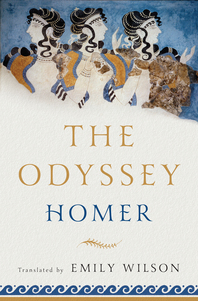The Odyssey
Written in iambic pentameter verse, Emily Wilson's Odyssey is a lean, fleet-footed translation that recaptures Homer’s “nimble gallop” and brings an ancient epic to new life. The New York Times named Wilson’s translation as one of its 100 notable books of 2018.
The Odyssey is available as a volume in the Norton Library (ISBN: 978-0-393-54340-7) and as a Norton Critical Edition (ISBN: 978-0-393-65507-0), edited by Professor Wilson. In addition to the full text translation, introduction, footnotes, and book summaries, the NCE includes: contextual materials including sources and analogues by Homer, Sappho, Pindar, and others; critical essays addressing key topics essential to the study of the Odyssey ; a glossary; and a list of suggested further readings.
Find the Odyssey at a local bookstore near you. The audiobook as read by Claire Danes is available on Audible.com.
Reviews and Observations:
Bryn Mawr Classical Review (October 28, 2018) “The Odyssey” by Corinne Pache
“ … an amazing achievement, a thrill to read, and the best English translation. Hers is the Odyssey my students will read from now on. It is a brisk, lively, often magical, version of the ancient epic that captures its enduring appeal and urgency."
The New York Times (March 15, 2018) "New Sentences: From Emily Wilson’s Translation of the ‘Odyssey’ " by Sam Anderson
"Rosy-fingered dawn, in this new version, takes on many minor variations. “When early Dawn revealed her rose-red hands.” “The early Dawn was born; her fingers bloomed.” My favorite rendering is “Soon Dawn appeared and touched the sky with roses.” It is so wonderfully delicate. It evokes, beautifully, the sky’s subtle changes at first light: how the colors phase in mildly, almost imperceptibly, the way a piece of white paper might blush if you rubbed it with a flower. And it is a perfect example of creative translation."
The New Statesman (January 21, 2017) "Emily Wilson Sensitively Considers The Odyssey’s Original Poetic Purpose and Resonance" by Josephine Balmer
"In practice, Wilson’s quiet ambition provides an immediacy and clarity, blowing away the cobwebs of pseudo-archaisms or epic pomposity, the brilliant clear sky after one of the many storms Odysseus endures."
The Daily Telegraph (January 20, 2017) "A Woman's Place Is in the Canon" by Edith Hall
"Wilson captures The Odyssey's tonal variety, from magical realism to comedy to despair."
The New York Times Book Review (December 12, 2017) "New & Noteworthy" by Susan Chira
“A revelation. Never have I been so aware at once of the beauty of the poetry, the physicality of Homer’s world, and the moral ambiguity of those who inhabit it. [Wilson’s] decisions to discard flowery conventions, and to limit herself to the number of lines in the original poem, produce a version both fleet and vivid.”
The Guardian (December 8, 2017) "The Odyssey translated by Emily Wilson review – a new cultural landmark" by Charlotte Higgins
"Emily Wilson’s crisp and musical version is a cultural landmark. … This translation will change the way the poem is read in English."
The Financial Times (December 8, 2017) "A Woman's Homeric Feat" by Nilanjana Roy
“Wilson’s Odyssey feels like a restoration of an old, familiar building that had over the years been encrusted with too much gilt. … She scrapes away at old encrusted layers, until she exposes what lies beneath.”
The New York Times (December 5, 2017) "A Version of Homer That Dares to Match Him Line for Line" by Gregory Hays
"Wilson is at her best in one of the poem’s greatest scenes, the first meeting in Book 19 between Penelope and her unrecognized husband:
Her face was melting, like the snow that Zephyr
scatters across the mountain peaks; then Eurus
thaws it, and as it melts, the rivers swell
and flow again. So were her lovely cheeks
dissolved with tears. She wept for her own husband,
who was right next to her."
National Public Radio (December 2, 2017) "Emily Wilson's 'Odyssey' Scrapes The Barnacles Off Homer's Hull" by Annalisa Quinn
"Wilson's project is basically a progressive one: to scrape away all the centuries of verbal and ideological buildup — the Christianizing (Homer predates Christianity), the nostalgia, the added sexism (the epics are sexist enough as they are), and the Victorian euphemisms — to reveal something fresh and clean. Why call them "handmaidens" when they were slaves? Why insist, as so many translators do, on 19th-century diction when that time had no more in common with Homer's than ours?"
The Atlantic (December 2017 issue) "The Odyssey and the Other" by Rebeea Newberger Goldstein
"In her powerful new translation, Emily Wilson, a classicist at the University of Pennsylvania, has chosen immediacy and naturalism over majestic formality. She preserves the musicality of Homer’s poetry, opting for an iambic pentameter whose approachable storytelling tone invites us in, only to startle us with eruptions of beauty."
The Washington Post (November 16, 2017) "The first English translation of The Odyssey by a woman was worth the wait" by Madeline Miller
"Wilson’s language is fresh, unpretentious and lean. Though there are plenty of finely wrought moments, she isn’t looking to gild the poetic lily but rather to emphasize the emotional arc of the story, engaging readers first and foremost with the plight and character of Odysseus. Relying on this forward motion, she is able to create real suspense where other translations make the reader glaze over. Even knowing the text well, I found myself rapt, particularly in the lead-up to Odysseus’s climactic vengeance on the suitors. Wilson deftly evokes the dramatic stakes, showing us the precariousness of Odysseus’s improvised plot, as well as the thrumming violence beneath."




